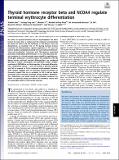| dc.contributor.author | Gao, Xiaofei | |
| dc.contributor.author | Lee, Hsiang-Ying | |
| dc.contributor.author | Li, Wenbo | |
| dc.contributor.author | Barrasa, M. Inmaculada | |
| dc.contributor.author | Ma, Qi | |
| dc.contributor.author | Elmes, Russell R. | |
| dc.contributor.author | Rosenfeld, Michael G. | |
| dc.contributor.author | Platt, Randall Jeffrey | |
| dc.contributor.author | Lodish, Harvey F | |
| dc.date.accessioned | 2018-04-24T14:51:25Z | |
| dc.date.available | 2018-04-24T14:51:25Z | |
| dc.date.issued | 2017-09 | |
| dc.date.submitted | 2017-06 | |
| dc.identifier.issn | 0027-8424 | |
| dc.identifier.issn | 1091-6490 | |
| dc.identifier.uri | http://hdl.handle.net/1721.1/114926 | |
| dc.description.abstract | An effect of thyroid hormone (TH) on erythropoiesis has been known for more than a century but the molecular mechanism(s) by which TH affects red cell formation is still elusive. Here we demonstrate an essential role of TH during terminal human erythroid cell differentiation; specific depletion of TH from the culture medium completely blocked terminal erythroid differentiation and enucleation. Treatment with TRβ agonists stimulated premature erythroblast differentiation in vivo and alleviated anemic symptoms in a chronic anemia mouse model by regulating erythroid gene expression. To identify factors that cooperate with TRβ during human erythroid terminal differentiation, we conducted RNA-seq in human reticulocytes and identified nuclear receptor coactivator 4 (NCOA4) as a critical regulator of terminal differentiation. Furthermore, Ncoa4 −/− mice are anemic in perinatal periods and fail to respond to TH by enhanced erythropoiesis. Genome-wide analysis suggests that TH promotes NCOA4 recruitment to chromatin regions that are in proximity to Pol II and are highly associated with transcripts abundant during terminal differentiation. Collectively, our results reveal the molecular mechanism by which TH functions during red blood cell formation, results that are potentially useful to treat certain anemias. Keywords: thyroid hormone; erythropoiesis; NCOA4; nuclear receptor | en_US |
| dc.description.sponsorship | United States. Defense Advanced Research Projects Agency (Award HR0011-14-2-0005) | en_US |
| dc.description.sponsorship | United States. Department of Defense (Award W81WH-12-1-0449) | en_US |
| dc.description.sponsorship | National Heart, Lung, and Blood Institute (Grant P01 HL032262-25) | en_US |
| dc.publisher | National Academy of Sciences (U.S.) | en_US |
| dc.relation.isversionof | http://dx.doi.org/10.1073/PNAS.1711058114 | en_US |
| dc.rights | Article is made available in accordance with the publisher's policy and may be subject to US copyright law. Please refer to the publisher's site for terms of use. | en_US |
| dc.source | National Academy of Sciences | en_US |
| dc.title | Thyroid hormone receptor beta and NCOA4 regulate terminal erythrocyte differentiation | en_US |
| dc.type | Article | en_US |
| dc.identifier.citation | Gao, Xiaofei, et al. “Thyroid Hormone Receptor Beta and NCOA4 Regulate Terminal Erythrocyte Differentiation.” Proceedings of the National Academy of Sciences 114, 38 (September 2017): 10107–10112 © 2017 National Academy of Sciences | en_US |
| dc.contributor.department | Massachusetts Institute of Technology. Department of Biological Engineering | en_US |
| dc.contributor.department | Massachusetts Institute of Technology. Department of Biology | en_US |
| dc.contributor.mitauthor | Platt, Randall Jeffrey | |
| dc.contributor.mitauthor | Lodish, Harvey F | |
| dc.relation.journal | Proceedings of the National Academy of Sciences | en_US |
| dc.eprint.version | Final published version | en_US |
| dc.type.uri | http://purl.org/eprint/type/ConferencePaper | en_US |
| eprint.status | http://purl.org/eprint/status/NonPeerReviewed | en_US |
| dc.date.updated | 2018-04-20T16:13:40Z | |
| dspace.orderedauthors | Gao, Xiaofei; Lee, Hsiang-Ying; Li, Wenbo; Platt, Randall Jeffrey; Barrasa, M. Inmaculada; Ma, Qi; Elmes, Russell R.; Rosenfeld, Michael G.; Lodish, Harvey F. | en_US |
| dspace.embargo.terms | N | en_US |
| dc.identifier.orcid | https://orcid.org/0000-0002-7029-7415 | |
| mit.license | PUBLISHER_POLICY | en_US |
